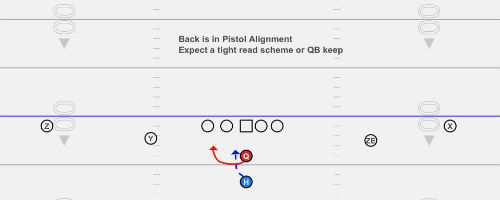Use these 3 pressure concepts to defend zone or power read

With every summer comes the task of designing your defense to attack your opponents’ most successful plays. In most cases, one of these offensive schemes is a read element, such as power or zone read.
While you may not be seeing these offenses for another month or so, it’s important to plan now how to take them away. At XandOLabs.com, one of our continuing research projects is how defenses are attacking these plays.
Below, I’ve detailed the important points of emphasis in our research.
Designing an attack
Before diving into specific schematics to defend zone read concepts, it’s important to understand how an offense will see the field. Like any option concept, the zone read is designed to take advantage of deficiencies in a defense’s scheme or personnel.
Option coaches typically plan to read a player they would have a hard time blocking or setting a formation that gives them a plus-1 advantage at the point of attack.
The same can be done on the defensive side. Keep in mind this post is purely centered on shotgun zone read offenses, but the same approach can be applied to wishbone or veer teams as well.
Assess the talents of the quarterback. If the quarterback is a legitimate running threat – as is the case for most zone option teams –you must find a way to tackle him on every snap, whether he has the ball or not.
Assess talents of the running back. This player is the one that the offense wants to carry the ball most of the time, so design your pressures to take away that component of the option game.
Identify the alignment of the offset back. Offenses are now adjusting the level of the running back into the following positions to get maximum efficiency:

Behind the QB alignment. Defenses should anticipate some form of inside zone read concept where the aiming point could be the playside A gap to backside C gap. In these situations, it’s important to cancel out those gaps in some fashion.

Next to the QB alignment. Defenses should anticipate some form of outside zone read concept such as power read or outside zone read where the aiming point could be the frontside A gap to frontside C gap. While it is important to have defenders to the side of the back, more teams are using this as a play side read.

Pistol alignment. The pistol alignment presents and issue because it is difficult to determine where the ball will go, but we’ve found more often than not these situations should be treated as behind the quarterback alignments.

Consider any presnap motions. Option offenses use motion in two ways: to provide “eye candy” to linebackers in order to dilute their reads or to get another player at the point of attack. If they are using the latter form, you need to get another player to the point of attack. This is mostly common in pistol zone bluff concepts where a fullback or H is assigned to block for the quarterback pull.
Specific pressures to attack zone read
Having said that, here are specific pressures that we have researched and targeted explicitly to attack each of the scenarios below:

Pressure concept: Tiger
Designed: To take away the quarterback
Source: Kean University in New Jersey
This pressure is tagged to the side away from the running back and can be executed out of a three- or four-down front. It sends three defenders to the read side of the play, forcing the quarterback to give the ball to the tailback and get the ball out of the quarterback’s hands.

Pressure concept: Rocket
Designed: To disrupt the power read
Source: Kilgore (Texas) High School
This pressure concept is executed out of a four-down front and is used against power read teams. The call tells our end he is a straight upfield player. It is not a read like chase – it’s a stunt.
On the snap, the end goes upfield. If he gets a base or hook block, he immediately presses the tackle or tight end upfield fast. If he gets a down block, he should already be upfield so he should handle anything that crosses his face, whether that player has the ball or not. This should take out the sweep part of the power read and give the quarterback a pull read.

Pressure concept: X Concept
Designed: To take away the running back
Source: St. John Fisher College in New York
The X Concept is a commonly used pressure out of 3-4 and 3-3 fronts. It is a gap exchange blitz between the Mike and either the Sam or Will linebacker. The blitz is tagged away from the back and in the direction in which he would be running.
Here’s a video of this concept:
<iframe width="420" height="315" src="https://www.youtube.com/embed/MVEpGbGE9Zw" frameborder="0" allowfullscreen></iframe>
As always, you can read more about defending the zone read, including the full length version of these concepts by visiting XandOLabs.com.
As we prepare for another football season, it’s always important to have answers defensively so players are in position to make plays. And as the zone read continues to evolve, so should your strategies to defend it.
Mike Kuchar is co-founder and senior research manager at XandOLabs.com, a private research company specializing in coaching concepts and trends. Reach him at mike@xandolabs.com or follow him on Twitter @mikekkuchar.
